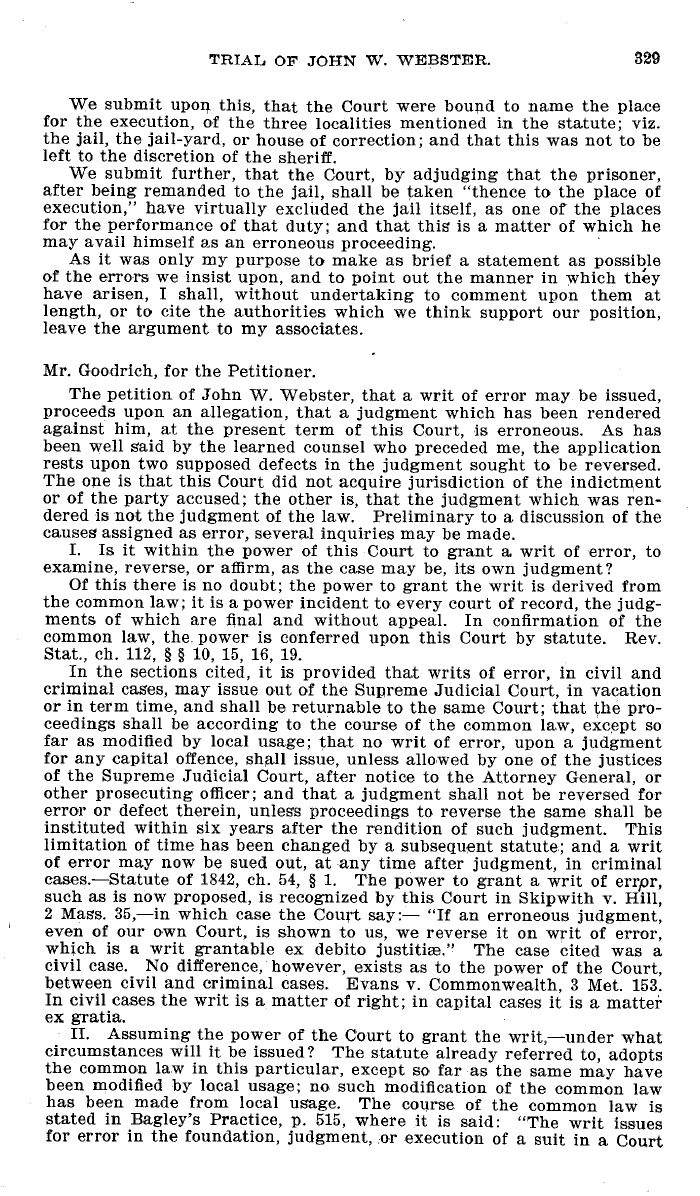|
TRIAL OF JOHN W. WEBSTER. 329
We submit upon this, that the Court were bound to name the place
for the execution, of the three localities mentioned in the statute; viz.
the jail, the jail-yard, or house of correction; and that this was not to be
left to the discretion of the sheriff.
We submit further, that the Court, by adjudging that the prisoner,
after being remanded to the jail, shall be taken "thence to the place of
execution," have virtually excluded the jail itself, as one of the places
for the performance of that duty; and that this is a matter of which he
may avail himself as an erroneous proceeding.
As it was only my purpose to make as brief a statement as possible
of the errors we insist upon, and to point out the manner in which they
have arisen, I shall, without undertaking to comment upon them at
length, or to cite the authorities which we think support our position,
leave the argument to my associates.
Mr. Goodrich, for the Petitioner.
The petition of John W. Webster, that a writ of error may be issued,
proceeds upon an allegation, that a judgment which has been rendered
against him, at the present term of this Court, is erroneous. As has
been well said by the learned counsel who preceded me, the application
rests upon two supposed defects in the judgment sought to be reversed.
The one is that this Court did not acquire jurisdiction of the indictment
or of the party accused; the other is, that the judgment which was ren-
dered is not the judgment of the law. Preliminary to a discussion of the
causes assigned as error, several inquiries may be made.
I. Is it within the power of this Court to grant a writ of error, to
examine, reverse, or affirm, as the case may be, its own judgment?
Of this there is no doubt; the power to grant the writ is derived from
the common law; it is a power incident to every court of record, the judg-
ments of which are final and without appeal. In confirmation of the
common law, the. power is conferred upon this Court by statute. Rev.
Stat., ch. 112, § § 10, 15, 16, 19.
In the sections cited, it is provided that writs of error, in civil and
criminal cases, may issue out of the Supreme Judicial Court, in vacation
or in term time, and shall be returnable to the same Court; that the pro-
ceedings shall be according to the course of the common law, except so
far as modified by local usage; that no writ of error, upon a judgment
for any capital offence, shall issue, unless allowed by one of the justices
of the Supreme Judicial Court, after notice to the Attorney General, or
other prosecuting officer; and that a judgment shall not be reversed for
error or defect therein, unless proceedings to reverse the same shall be
instituted within six yeaxs after the rendition of such judgment. This
limitation of time has been changed by a subsequent statute.; and a writ
of error may now be sued out, at any time after judgment, in criminal
cases.-Statute of 1842 ch. 54, § 1. The power to grant a writ of errpr,
such as is now proposed, is recognized by this Court in Skipwith v. Hill,
2 Mass. 35,-in which case the Court say:- "If an erroneous judgment,
even of our own Court, is shown to us, we reverse it on writ of error,
which is a writ grantable ex debito justitix." The case cited was a
civil case. No difference, however, exists as to the power of the Court,
between civil and criminal cases. Evans v. Commonwealth, 3 Met. 153.
In civil cases the writ is a matter of right; in capital cases it is a
matter
ex gratia.
II. Assuming the power of the Court to grant the writ,-under what
circumstances will it be issued? The statute already referred to, adopts
the common law in this particular, except se far as the same may have
been modified by local usage; no such modification of the common law
has been made from local usage. The course of the common law is
stated in Bagley's Practice, p. 515, where it is said: "The writ issues
for error in the foundation, judgment, or execution of a suit in a Court
|

